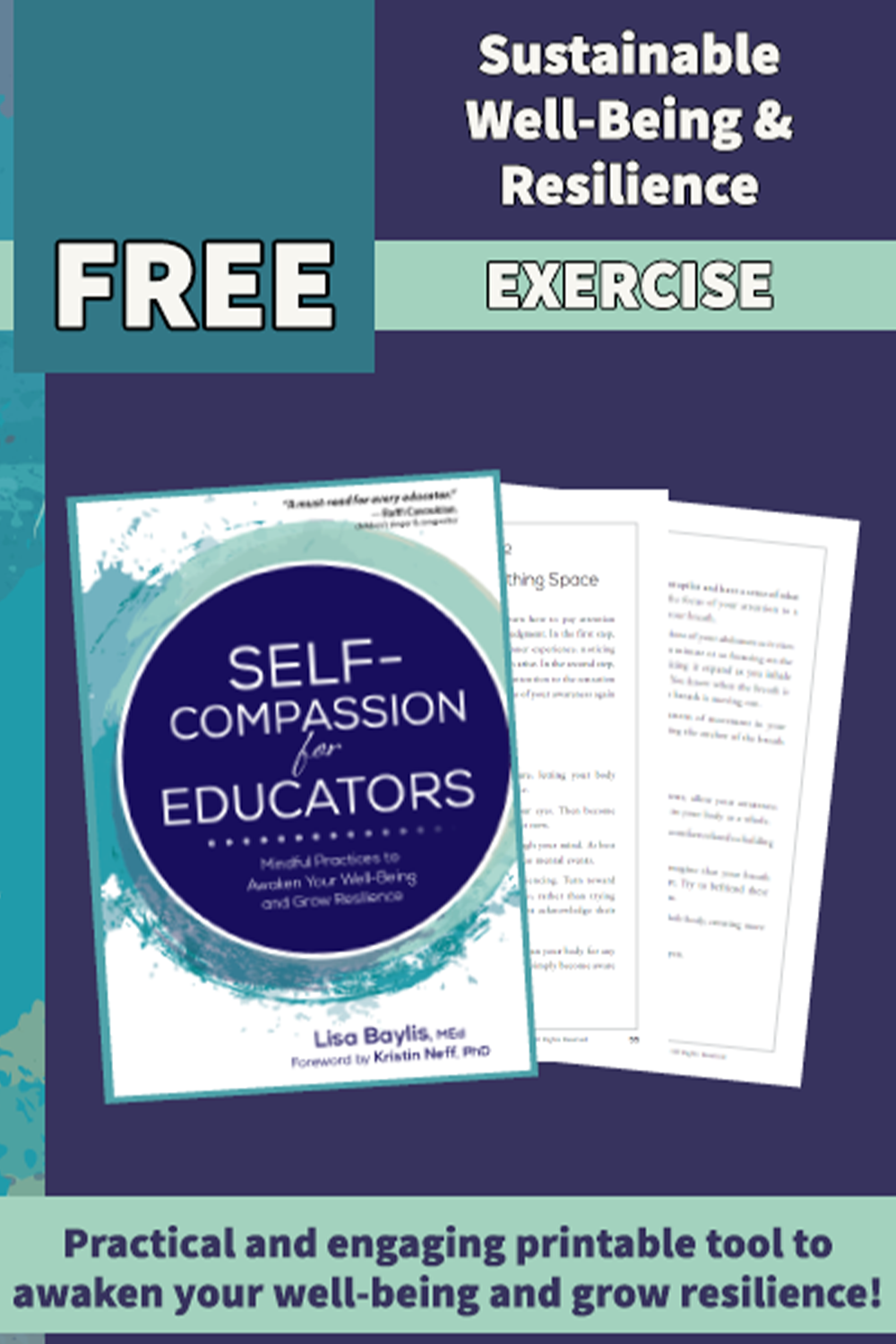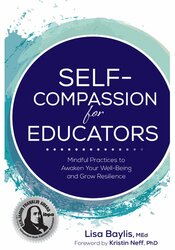Sustainable Well-Being and Resilience
Free Resource from Self-Compassion for Educators

Sustainable Well-Being
Finding ways to support all the aspects of well-being in your life—physical, intellectual, emotional, social, financial, environmental, and spiritual—is the key to staying well. All these dimensions are interconnected and important to a well-rounded and balanced lifestyle. If you are struggling to productively handle the daily stressors in your life, it is possible that you may be focusing on one part of your well-being but not on others. For example, maybe you’re doing a great job looking after your mental well-being, but your physical well-being needs some attending to.
Now, even though I just wrote about the importance of maintaining a “balanced” lifestyle, I will admit that I’m not a fan of the term balance. I think it’s a fallacy that doesn’t exist, and yet we are all constantly striving for it. And it’s actually in our attempts to achieve balance that we push ourselves beyond our capability instead of being compassionate with ourselves.
I believe life is a little more like a symphony. We can’t allow all aspects of our life to sound off at the same time, or it will sound (and feel) terrible. In trying to achieve balance, we attempt to give the same amount of attention to each part of our life. This just can’t exist. Like a symphony, sometimes we need to turn down some parts of our life to hear the other parts that need attention. Sometimes we need to turn down the trumpets so we can hear the strings.
Therefore, the trick is not to achieve balance, but to discover a rhythm. Using our mindful awareness, we can find more profound wisdom that enables us to notice when some part of our life feels out of tune. It is then we ask ourselves the compassionate question: “What do I need right now?” Our answer then helps guide our rhythm and our wellness wheel. And therein lies the goal of sustainable well-being: to know when you’re under stress or suffering (mindfulness) and to respond with care and kindness (self-compassion).
So let’s not strive for balance. Instead, let’s lean into clearly hearing what parts of our lives need to be turned up or turned down.
The Seven C’s of Resilience
If you’ve been reading my other articles—and especially if you’ve been reading my book Self-Compassion for Educators—by now you have taken some time to learn why (in your head) you need to practice mindfulness and self-compassion, and you’ve discovered practices on how to feel these practices (in your body). We’ve aligned these practices to a strong sense of knowing and feeling.
In the last seven chapters of Self-Compassion for Educators, I dive into what we need to do to care for ourselves and build our resilience. In particular, each chapter explores the following tangible practices you can do to build resiliency:
1. We first need to have the courage to slow down, ask for what we need, and be brave enough to know we’re not okay. We need to permit ourselves to prioritize our well-being.
2. Once we have the courage, we need to get curious about what it is we truly need.
3. Then we need to clear our way: to open up space (both physically and metaphorically) to heal, grow, and strengthen our resiliency.
4. But we can’t do it alone, so we learn to ask for help and build our community.
5. And then we get down to the task of cultivating the care we need by identifying the components of well-being we need to attend to in our life.
6. Next we build an awareness of our strengths so we can create a culture that prioritizes well-being.
7. Last, we hold all of this—the world, our students, our colleagues, and most of all, ourselves—in compassion.
Teaching is a caring profession. Caring too much can have its problems, as can not caring enough. Somehow we need to find the capacity to care without burning out. If we want to sustain our well-being, we need to put ourselves first. And that doesn’t mean we need to live the epitome of health and well-being. It does mean we need to have enough in our wellness tank to be present in the world. By being kind and gentle with ourselves, and paying attention to the seven C’s, we can create a community in our schools and our lives that keeps us well and present.
So let’s talk about educator well-being and resilience. Let’s bring the discussion to the foreground. Let’s remind people that if we want our students to be well, we need our educators to be healthy, present, open, and well. As educators, we model and inspire our youth, and when we do it from a place of kindness and compassion, we will all grow to be healthier and happier human beings.
When I find myself asking, "What do I really need right now?" from a loving and kind place, I find the answer is often in my quick six exercise. This simple practice is an easy reminder of what you can do to feel better in any given moment.
Click here to download your free resource!

Have you read my first blog post? Learn more about my most difficult moments as an educator and get free access to the strategies that have helped me in Self-Compassion in Our Most Difficult Moments.
Finding ways to support all the aspects of well-being in your life—physical, intellectual, emotional, social, financial, environmental, and spiritual—is the key to staying well. All these dimensions are interconnected and important to a well-rounded and balanced lifestyle. If you are struggling to productively handle the daily stressors in your life, it is possible that you may be focusing on one part of your well-being but not on others. For example, maybe you’re doing a great job looking after your mental well-being, but your physical well-being needs some attending to.
Now, even though I just wrote about the importance of maintaining a “balanced” lifestyle, I will admit that I’m not a fan of the term balance. I think it’s a fallacy that doesn’t exist, and yet we are all constantly striving for it. And it’s actually in our attempts to achieve balance that we push ourselves beyond our capability instead of being compassionate with ourselves.
I believe life is a little more like a symphony. We can’t allow all aspects of our life to sound off at the same time, or it will sound (and feel) terrible. In trying to achieve balance, we attempt to give the same amount of attention to each part of our life. This just can’t exist. Like a symphony, sometimes we need to turn down some parts of our life to hear the other parts that need attention. Sometimes we need to turn down the trumpets so we can hear the strings.
Therefore, the trick is not to achieve balance, but to discover a rhythm. Using our mindful awareness, we can find more profound wisdom that enables us to notice when some part of our life feels out of tune. It is then we ask ourselves the compassionate question: “What do I need right now?” Our answer then helps guide our rhythm and our wellness wheel. And therein lies the goal of sustainable well-being: to know when you’re under stress or suffering (mindfulness) and to respond with care and kindness (self-compassion).
So let’s not strive for balance. Instead, let’s lean into clearly hearing what parts of our lives need to be turned up or turned down.
The Seven C’s of Resilience
If you’ve been reading my other articles—and especially if you’ve been reading my book Self-Compassion for Educators—by now you have taken some time to learn why (in your head) you need to practice mindfulness and self-compassion, and you’ve discovered practices on how to feel these practices (in your body). We’ve aligned these practices to a strong sense of knowing and feeling.
In the last seven chapters of Self-Compassion for Educators, I dive into what we need to do to care for ourselves and build our resilience. In particular, each chapter explores the following tangible practices you can do to build resiliency:
1. We first need to have the courage to slow down, ask for what we need, and be brave enough to know we’re not okay. We need to permit ourselves to prioritize our well-being.
2. Once we have the courage, we need to get curious about what it is we truly need.
3. Then we need to clear our way: to open up space (both physically and metaphorically) to heal, grow, and strengthen our resiliency.
4. But we can’t do it alone, so we learn to ask for help and build our community.
5. And then we get down to the task of cultivating the care we need by identifying the components of well-being we need to attend to in our life.
6. Next we build an awareness of our strengths so we can create a culture that prioritizes well-being.
7. Last, we hold all of this—the world, our students, our colleagues, and most of all, ourselves—in compassion.
Teaching is a caring profession. Caring too much can have its problems, as can not caring enough. Somehow we need to find the capacity to care without burning out. If we want to sustain our well-being, we need to put ourselves first. And that doesn’t mean we need to live the epitome of health and well-being. It does mean we need to have enough in our wellness tank to be present in the world. By being kind and gentle with ourselves, and paying attention to the seven C’s, we can create a community in our schools and our lives that keeps us well and present.
So let’s talk about educator well-being and resilience. Let’s bring the discussion to the foreground. Let’s remind people that if we want our students to be well, we need our educators to be healthy, present, open, and well. As educators, we model and inspire our youth, and when we do it from a place of kindness and compassion, we will all grow to be healthier and happier human beings.
When I find myself asking, "What do I really need right now?" from a loving and kind place, I find the answer is often in my quick six exercise. This simple practice is an easy reminder of what you can do to feel better in any given moment.
Click here to download your free resource!

Have you read my first blog post? Learn more about my most difficult moments as an educator and get free access to the strategies that have helped me in Self-Compassion in Our Most Difficult Moments.
Get more simple, accessible, and easy-to-use practices

There has never been a time in history when educators have felt such overwhelming levels of stress, burnout, and exhaustion. Still, we depend on teachers to be a positive guiding force in our children’s lives - often playing simultaneous roles as educator, parent, mental health counselor, and caring friend. For educators to fulfill these vital roles, it’s abundantly clear that they need to develop resiliency both inside and outside the classroom.
Written by fellow educator and mindful self-compassion expert, Lisa Baylis, MEd, this book provides educators with simple, accessible, and easy-to-use practices that will inspire them to care for themselves - instead of adding to their chaos - so they can continue doing the profession they love.
Within Self-Compassion for Educators, busy and overwhelmed teachers can learn how to:
Written by fellow educator and mindful self-compassion expert, Lisa Baylis, MEd, this book provides educators with simple, accessible, and easy-to-use practices that will inspire them to care for themselves - instead of adding to their chaos - so they can continue doing the profession they love.
Within Self-Compassion for Educators, busy and overwhelmed teachers can learn how to:
- Reduce feelings of shame, criticism, and self-doubt
- Anchor themselves to the present moment
- Develop greater compassion for themselves and others
- Mitigate the effects of chronic stress and develop resilience
- Cultivate a sense of gratitude
- Practice self-care routines that create sustainable well-being
- Avoid exhaustion and burnout
Meet the Expert:
Lisa Baylis, MEd, has been sharing wellbeing strategies for the last 20 years. A natural-born connector with an innate ability to make people feel valued and heard, she is a teacher, school counselor, facilitator, and mother. Trained by mindful self-compassion pioneers Chris Germer and Kristin Neff, Lisa is also a certified mindful self-compassion (MSC) teacher. Her accessible and inclusive presentations have built her a reputation as one of the most trusted self-compassion experts for educators in North America.
Learn more about their educational products, including upcoming live seminars, by clicking here.
Learn more about their educational products, including upcoming live seminars, by clicking here.





